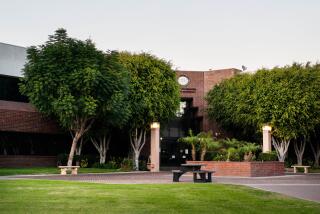UCSD Gets $1.3 Million for Cardiovascular Research
In an effort to combat heart disease, the No. 1 killer in the United States, the American Heart Assn. has awarded $1.3 million to UC San Diegoâs School of Medicine to serve as one of six national centers studying the molecular biology of the cardiovascular system.
âCurrently, most of our treatments for cardiovascular disease alleviate symptoms without addressing the fundamental basis of the problem,â Kenneth Chien, UCSD associate professor of medicine, said in a press release Tuesday.
Chien has been selected to direct the new Bugher Center for Cardiovascular Molecular Biology, which received the five-year grant earlier this month. With the center, doctors hope to expand their knowledge of heart disease and catch up with breakthroughs made in the study of other diseases.
âMolecular biology has been integrated into cancer and blood diseases research, and we have seen consequent improvement in patient care,â Chien said. âWe need to apply sophisticated molecular, cellular and genetic techniques to understand underlying causes of cardiovascular diseases and to develop new therapies or ways to prevent heart disease.â
UCSD spokeswoman Denine Denlinger predicted that approaching heart disease by looking for the molecular causes that trigger it will be âthe wave of the future.â
Nineteen UCSD School of Medicine faculty members will join the center in four areas of research: atherosclerosis, hypertension, adaptation of hearth muscle growth during increased workloads or after muscle injury, and the biology of blood vessels.
Under the program, nine graduate students will be named Bugher Fellows each year. These individuals will join one of the four research areas, working with senior scientists.
The program is funded by the Henrietta B. and Frederick Bugher Foundation, which established the first cardiovascular molecular biology research centers in Boston, Houston and Dallas in 1985. Frederick H. Bugher established the foundation before his death in 1984 in honor of his parents.






